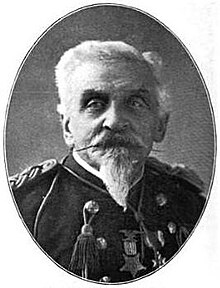Charles DeRudio
| Charles Camillo DeRudio | |
|---|---|

Charles C. DeRudio
|
|
| Born |
August 26, 1832 Belluno, Kingdom of Lombardy–Venetia |
| Died | November 1, 1910 (aged 78) Pasadena, California |
| Place of interment | San Francisco National Cemetery |
| Allegiance | United States of America |
| Service/branch | United States Army |
| Years of service | 1864–1866 1867–1896 |
| Rank | Major |
| Unit | 7th Cavalry Regiment |
| Battles/wars | |
Charles Camillo DeRudio, originally Carlo Camillo Di Rudio, (August 26, 1832 – November 1, 1910) was an Italian aristocrat, would-be assassin of Napoleon III, and later a career U.S. Army officer who fought in the 7th U.S. Cavalry at the Battle of the Little Bighorn.
Carlo di Rudio was born in Belluno, Italy. He was the son of Count and Countess Aquila di Rudio. (Shortly before his death, he was interviewed by Walter Mason Camp, and showed him family records going back to 1680.) As a teenager, he attended an Austrian military academy in Milan, today known as Military School "Teulié". At the age of 15, di Rudio left to join the Italian patriots during the uprising in 1848, and participated in the defense of Rome and, later, of Venice against the Austrians. He was shipwrecked off Spain in an aborted attempt to sail to America. By 1855, he was living in east London (England) and had married Eliza, the 15-year-old daughter of a confectioner. They eventually had three daughters and two sons.
On January 14, 1858, during a visit to the Salle Le Peletier of the Paris Opera, three bombs were thrown at the royal procession of Emperor Louis Napoleon (Napoleon III). Eight people and a horse were killed and one hundred and fifty injured. Four men were arrested: Felice Orsini, the leader of the plot, Giuseppi Pieri, Antonio Gomez, and a Portuguese beer salesman named "Da Selva," which turned out to be di Rudio. (See Orsini affair for details). Orsini and Pieri were guillotined on March 14 and Gomez was sentenced to life imprisonment on Devil's Island. di Rudio was initially condemned with Orsini and Pieri, but someone pleaded clemency for him and the sentence was commuted to life on Devil's Island. Several months later, he was with twelve others who escaped from the prison and made their way to British Guiana. From there, di Rudio made his way back to London and his wife and went on the lecture circuit. His name was anglicized as 'Charles DeRudio'.
...
Wikipedia
